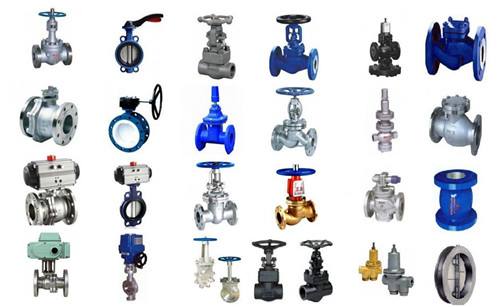6.
Valves for petrochemical equipment
a. Oil refining equipment
Valves for oil refining equipment are mostly pipeline valves, and they are mainly gate valves, globe valves, check valves, safety valves, ball valves, butterfly valves and steam traps. Gate valves account for 80% of these valves, and these valves account for 3% to 5% of the total investment of oil refining equipment.
b. Chemical fiber equipment
Chemical fiber products are mainly polyester fibers, polyacrylic fibers and vinylon three categories. Valves for chemical fiber equipment are ball valves and jacketed valves such as jacketed ball valves, jacketed gate valves and jacketed globe valves.
c. Acrylonitrile equipment
Acrylonitrile equipment requires valves with the API standard, and they are mainly gate valves, globe valves, check valves, ball valves, steam traps, needle valves and
plug valves. Gate valves account for about 75% of the total valves.
d. Synthesis ammonia equipment
The required technical features of valves are different due to different technical processes. At present, valves for synthesis ammonia equipment are mainly gate valves, globe valves, check valves, steam traps, butterfly valves, ball valves, diaphragm valves, regulating valves, needle valves, safety valves, high temperature valves and cryogenic valves in China. Among these valve products, globe valves account for 53.4% of the total valves, gate valves 25.1%, steam traps 7.7%, safety valves 2.4%, regulating valves, cryogenic valves and other valves 11.4%.
e. Ethylene equipment
Ethylene equipment is very important in the petrochemical industry, and it requires a wide range of valves such as gate valves, globe valves, check valves and rising stem ball valves. Gate valves are the most widely used and rising stem ball valves are the second most used among these valves. In addition, ultra high temperature valves, ultra low temperature valves and ultra high pressure valves are required for large-scale ethylene and high-pressure polyethylene equipment.
f. Air separation equipment
Air separation equipment requires valves such as
globe valves, safety valves, check valves, regulating valves, ball valves, butterfly valves and cryogenic valves.
g. Polypropylene equipment
Polypropylene is a kind of polymer compound which is made of propylene through polymerizing. Polypropylene equipment requires valves such as gate valves, globe valves, check valves, needle valves, ball valves and steam traps.
7.
Valves for power stations: The construction of the power station is in the development direction of being large-scale in China. Therefore, safety valves, pressure reducing valves, globe valves, gate valves, butterfly valves, emergency shut-off valves and flow control valves with large diameter and high pressure are required for power stations.
8.
Valves for metallurgy: Pulp Valves with wear resistance and regulating traps are mainly used for the metallurgy industry. Metal sealed
ball valves, butterfly valves, globe valves and four-way reversing valves are used in the steelmaking industry.
9.
Valves for offshore platforms: With the development of offshore oil field exploitation, the demand for offshore platform valves is also gradually increasing. Shut-off ball valves, check valves and multiple unit valves are used for offshore platforms.
10.
Valves for food and drug industries: Stainless steel ball valves, nontoxic all plastic ball valves and butterfly valves are mainly used for these two industries. The demand for the commonly used valves such as instrument valves, needle valves, gate valves, globe valves, check valves, ball valves and butterfly valves is in the majority in all the valves mentioned above.
